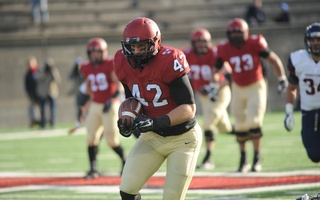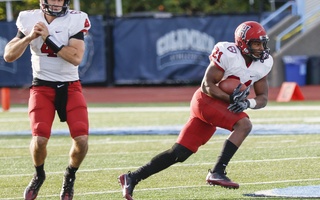{shortcode-24127391b02777b2e18c9062a2e47a5ec12c5a33}
Penn wide receiver Justin Watson is likely bound for the NFL. First he must pass through Harvard Stadium.
The reigning Ivy League Offensive Player of the Year has visited once before. In 2015, Watson totaled 249 yards of offense on 12 touches. The climax came in the fourth quarter, when the then-sophomore took a handoff at his own 21, swept right, and outraced the world to the end zone.
The score iced a 35-25 victory for the Quakers—meaning the only loss of the season for the 2015 Crimson. Harvard veterans remember the disappointment, and they remember the man who caused it.
The truth is that Watson has inflicted heartbreak on many opponents. Just last week, he grabbed a 15-yard touchdown with 1:12 left to send Princeton to a 38-35 defeat.
You should predict this production from someone picked as a preseason All-American. You should expect big numbers from someone who has led the Ancient Eight in catches, yards, and scores in the last two seasons and taken over Penn records for receptions and yards. You should anticipate highlight reel moments, such as the 17-yard score in week five that forced overtime against then-undefeated Columbia.
The expectation is exactly what makes Watson so special. Opponents know where the ball is going. They have seen the film. They can strategize for weeks. And still, Watson collects his yards.
“He’s what our kids would call ‘a dude,’” Crimson coach Tim Murphy said. “He’s absolutely one of the best wide receivers I’ve ever seen.”
It’s easy to run out of adjectives when describing Watson, so let’s start with one: steely.
Steely, because Watson grew up Bridgeville, Pa., about 15 minutes outside of industrial capital Pittsburgh. Watson’s grandfather, in fact, was a steelworker. There’s a reason that the Pittsburgh football team is called the Steelers, and a reason that Watson roots for them.
Steely, also because Watson is built like a 6’3” iron column. He weighs 225 pounds, up 15 pounds from last year and a total of 40 since high school. It takes a lot of muscle to hold up an offense.
But steely, more than anything else, because Watson rarely yields. His Twitter bio reads, “Commitment is when the purpose in your heart is stronger than the pain in your body.” That attitude manifests every Saturday, when a grueling offseason regimen translates into on-field success.
At no point was the formula more apparent than the summer of 2016, when Watson worked in Philadelphia. The Wharton School student took an internship at Logan Circle Partners, an asset management firm, and worked in the same office as then-quarterback Alek Torgersen.
The thrower-receiver duo ate lunch at Wawa. Sometimes they tossed a Styrofoam football around the office. At 5 p.m., they caught the subway back to campus for strength training and passing drills.
Harvard seniors have strong memories of last November’s game, when the Quakers upset the Crimson after Watson caught a two-yard touchdown. Well, the Penn star had been practicing that post route non-stop for several months.
“We know he’s going to get his catches,” senior safety Tanner Lee said. “We’ve got to keep him contained.”
Watson’s work ethic originates with his parents. Doug and Terri each worked two jobs as they raised four children. Watson—who has not available for comment due to Penn restrictions on midweek interviews with athletes—learned to contribute. His oldest brother Tommy has cerebral palsy, and Watson helped with caretaking.
Watson has continued that supporting role as a member of the Quakers. In 2015, Penn football named Vhito DeCapria as an honorary team captain. DeCapria, a six-year-old cancer survivor, has remained with the team and latched onto Watson as his favorite player. Watson, in turn, has made time to hang out with DeCapria.
Still, Watson’s dedication is most obvious on the gridiron, where he outclasses defensive backs with precise footwork, soft hands, and strength.
“He’s hard to single-cover,” Murphy said. “Even when you do cover him, he’s so big and physical that they stuff the ball into him.”
Watson emerged at South Fayette, a suburban high school with roughly 200 students per grade. As a senior, Watson captained the football team to a 16-0 season, including a 41-0 romp in the Class AA championship. Watson finished the year with 1,568 receiving yards (fourth in state history) and 22 touchdowns (third in state history).
Typically, such a stat line would attract attention from major FBS programs. Throw in Watson’s all-around athleticism—as evidenced by his captain role in the basketball team—and you wonder why Big 10 schools didn’t come calling.
The wrinkle was that Watson had committed to Penn before his senior year. He stayed true to the obligation even as several FBS recruiters tried to change his mind.
The Quakers are certainly glad that Watson proved stubborn. Before this season, on Aug. 18, the Philadelphia Inquirer published an article called “A Penn football all-American? Justin Watson fits the bill.” That story contained some braggadocio from Watson: “I think I’d start on any FBS team in the country.” Few could disagree. Some, in fact, would go further.
Princeton graduate Ross Tucker played for five NFL teams as an offensive lineman before becoming a television analyst. Midway through the 2017 season, Tucker pronounced that Watson “may be the best Ivy player in my 20 years in the league.”
“The kid could play anywhere,” Murphy said. “He’s definitely a pro prospect in our league.”
Watson has the numbers to substantiate the claim. In 2014, the wide receiver set Quakers freshman records with 42 catches and 497 yards. The lone setback came in the form of a shoulder injury, which required offseason surgery.
The rust never showed, as Watson returned to place fifth in the FCS in receptions and yards. He landed on the All-American third team.
In 2016, Watson did even better, seizing a school record with 1,115 receiving yards—in other words, over 100 per game. This time, he landed on the All-American second team and finished as a finalist for the FCS Offensive Player of the Year.
Do you spot any patterns? Murphy does. When asked about Watson, the coach widened his eyes and let out a sigh.
“He’s got it all,” Murphy said. “How many 6’3”, 220-plus-pound wide receivers are there in the country that can run a 10.8 hundred meters, have great hands, and are tough, dependable, and physical?”
The 2015 game was only the first time that Watson tormented Harvard. The next season, the wide receiver caught 10 passes for 120 yards. When Penn received the ball with 3:23 left in a 14-14 game, Watson spearheaded the drive. He extended the possession with a third-and-eight catch and scored the final touchdown.
This Saturday, the Crimson has about 57 reasons to fixate on Watson. As opponents have learned repeatedly, though, it’s not enough to focus on the wide receiver. It’s not enough to scheme well or throw extra defenders.
Put it this way—you can hammer steel as much as you want, but rarely does it break.
“He’s a great player,” Lee said. “We just have to go out there, compete, and play our best football.”
—Staff writer Sam Danello can be reached at sam.danello@thecrimson.com.
Read more in Sports
In Penultimate Week of Football, Anything Possible

















